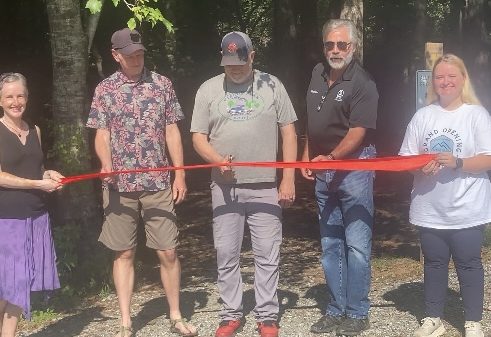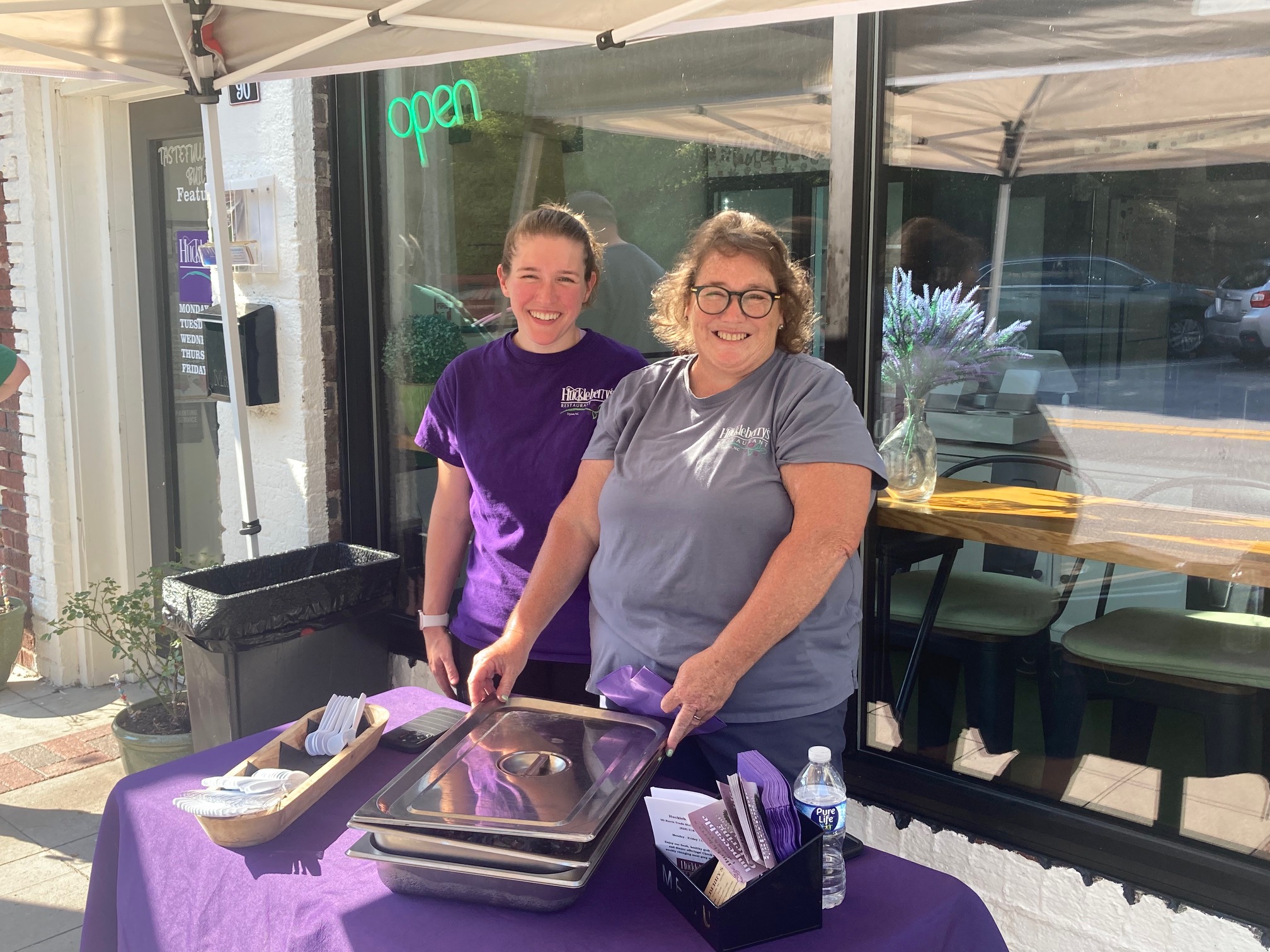Commissioner candidates address elevation vs. slope, economic development
Published 6:31 pm Friday, October 12, 2012
About 55 attend forum in Saluda
During a forum held Thursday, Oct. 11, Polk County commissioner candidates answered six questions, ranging from economic development to each candidate’s position on elevation or slope for mountain and ridgeline protection and a county-wide water system.
About 55 residents attended the forum, which was held at and sponsored by the Saluda Center. Executive board chair Karen Bultman moderated the event.
After giving biographies, commissioner candidates Keith Holbert (R), Emily Bartlett (D), Michael Gage (R), Tom Pack (R), Russell Mierop (D) and Renée McDermott (D) answered questions submitted by audience members.
Promoting Polk County
The first question asked candidates how they will promote other areas of the county given that the economic development commission put together a video that promotes horse farms and vineyards.
Holbert said there are other things that can be brought into Polk County besides horse farms and vineyards. He mentioned Carolina Yarn Processors bringing more jobs but said there is a problem with dredging water from the pond as an example of hurdles they will have to go through to make the new jobs happen. The county needs to make sure it has businesses come to Polk County, he said.
Bartlett said water is an issue for the county attracting businesses. She said she’d like to see a center where the county helps incubate and develop small businesses. She also said she’d like to see a stronger presence for Isothermal Community College, with the college offering training for any manufacturing businesses that want to come to Polk.
“We need to help ourselves first,” Bartlett said.
Gage said he doesn’t want to overregulate to the point where businesses don’t want to come here. Taxes and infrastructure are going to attract businesses, he said. Gage said he would sit down with the economic development commission to see what direction they are going. He said farms need other income and Polk needs to get manufacturing back by producing the infrastructure to attract those people.
“It’s a very complicated thing and it all takes balance,” said Gage.
Pack said the county needs building sites ready to bring businesses in.
“We have a lot of storefronts but not actual buildings,” he said. “Polk County is not business friendly.”
Pack mentioned the proposed unified development ordinance (UDP) saying when a business wants to come in, (county staff) is going to hand them a document that is almost 400 pages. He said a Rutherford County official told him Rutherford County wants Polk to pass the UDO so jobs will continue to come to Rutherford County. He also mentioned recent statistics in the Region C area showing that hundreds of jobs came to Rutherford, Cleveland and McDowell counties and Polk County had zero.
Mierop said Polk needs to work on infrastructure to create a better economic climate for not just jobs but careers. He said the county should continue laying water lines along the major highways and to continue working on education so Polk students are able to obtain careers in the county. He also said the county should continue work on its policies to make sure it is business friendly and that the county has designated areas where business is suitable.
McDermott said she is concerned about being business friendly too, but there’s a lot that has already been done. She said there was an unfortunate situation when a manufacturing company wanted to come to Polk but said there were not enough people trained and ready to work for them. McDermott said she helped Green River Adventures expand their business by coming up with a plan and writing changes to the ordinances so they could expand quickly.
UDO, MRPO positions
Moderator Bultman said she was handed eight questions pertaining to the UDO and mountainside and ridgeline protection ordinance (MRPO). She consolidated the questions into asking candidates whether they support using slope or elevation to determine regulations on land usage and what exactly they feel the county has accomplished.
“What we’ve accomplished so far is we seem to have everybody angry,” Holbert said.
Holbert added that if the county uses elevation it isolates everyone in Saluda, which is not fair. And using slope throughout the county punishes everyone, he said. He said the county should let the building inspector use his judgment in deciding whether an engineer is needed in a particular case.
Bartlett said she attended a Polk County Planning Board meeting prior to the forum. She said the document can have two purposes. There is the health and safety issue and the county’s employees are going to use the document to administer the policies, she said.
“In my mind I’m looking for a clear and concise document,” Bartlett said. “It’s not fair to treat one part of the county differently than other parts.”
She said she is looking for what is fair to everyone and doesn’t have an opinion one way or the other. She said she doesn’t want to be unfavorable to businesses, but the county does need some protection.
Gage said he thinks the MRPO should be thrown out and the county needs to let the building inspection department do its job. The UDO, he said, needs to be thrown out. Gage said the county needs to go back to its original purpose with the UDO and put the ordinances together.
Pack said he believes the MRPO and UDO are very punitive for people who live in Polk County. He is a supporter of property rights, he said, and thinks documents like these are geared more for gated communities and towns.
“We haven’t had any slides because (building inspector) Steve Jones does his job,” Pack said. “If he’s not confident he can call for an engineer or soil scientist.”
Pack said regulations need to be looked at for each site individually.
Mierop said his college education included a lot of soil classes and there is an equation that is more slope based.
He said he is in favor of what the community wants and thinks there needs to be a democratic process.
McDermott said several folks have said the building inspector needs to be the one to call the shots but the county attorney strongly urged the county not to do that saying it is a straight path to county liability.
She said protections need to be determined by ordinance, not by an individual. McDermott also said Gage said to throw out the MRPO and she finds that interesting since he voted for a much stricter ordinance when he was on Columbus Town Council.
“It kind of puzzles me why that one would be good and this one would be bad,” McDermott said.
She also said the comprehensive plan started in 2008, when Pack voted to pay almost $91,000 for the plan, with some of that paying for the UDO.
She said voters need to look at who has been in the process and that it was bipartisan until the election began.
Gage later rebutted McDermott’s statements, saying when he served on Columbus Town Council he voted the way he did because that was what the people wanted.
County-wide water system
Candidates were also asked if they favor or oppose a county-wide water system with most saying eventually it would be beneficial for the county.
Gage said he is not going to say whether he’s in favor of a county-wide water system or not. He said it’s complicated because he doesn’t want to force the towns. He said if the towns want to participate he’s in favor of such a system.
“It’s got to be everybody wanting to get in,” Gage said. “Eventually we will have to. Eventually I can see it happening.”
McDermott said a previous board adopted a water distribution plan but it doesn’t account for the water system paying for itself. She said she’s never heard of a water system being put in place without a water feasibility study or a rate study, which still needs to be done.
Candidates’ top priorities
The last question asked each candidate what their top three issues are and how they would deal with them.
Holbert said, “Jobs, jobs, jobs.”
He said kids are coming out of the schools and the county has nowhere for them to work.
Bartlett said jobs are an issue and that jobs and education go hand and hand. She said Isothermal Community College does a great job but is not large enough to handle training for jobs and needs to be expanded. Another issue she said is county debt and paying for future expenditures like Lake Adger Dam repairs. Bartlett also said the county needs long-range planning to eliminate the county’s debt.
Gage said jobs are a top issue, such as manufacturing jobs where people have health insurance. He said the county needs to support the school system and the sheriff’s office. He also said the county needs to get deputies back into the school system and support emergency services.
Pack said his top priority is jobs and mentioned the high percentage of citizens who have to go outside Polk County to work. Another issue he said is taxes and the county being conservative, as well as looking at expenditures, such as setting aside money for repairs to the Lake Adger dam. He said the county needs to support its public safety and work with the fire departments, EMS and rescue.
Mierop said education leads to training for specialized careers and he would like to see residents his age finding work here. He also said infrastructure is an issue and where that infrastructure is will help Polk County with getting careers for people of his generation.
McDermott said she agrees that economic development is a really big issue. She said Polk made a great leap forward this year, but probably needs to put more resources toward economic development. She said the county needs to expand offerings at Isothermal Community College. Her third priority is fiscal responsibility. McDermott said the county needs long-range planning for both the known and unknown.
“You need capital reserves,” McDermott said. “I think we’ve been doing a good job with it the past four years.”
The forum also included speeches from Polk County Clerk of Court candidates Pam Hyder (D) and Marche Pittman (R); Phil Feagan (D), who is running for N.C. Senate District 47; Chris Whitmire (R), who is running for N.C. House of Representatives District 113, and Emily Cowan, who is running for district court judge. Judges run unaffiliated.
Early voting begins this Thursday, Oct. 18 at three locations. Voters can go to the board of elections office in Columbus Monday through Friday from 8:30 a.m. to 5 p.m. or the Mill Spring Fire Department or Green Creek Community Life Center Monday through Friday from noon to 7 p.m. All three locations will be open on the last day to early vote on Sat., Nov. 3 from 9 a.m. to 1 p.m. Election day is Tuesday, Nov. 6, when all polling places throughout the county will be open from 6:30 a.m. until 7:30 p.m.





